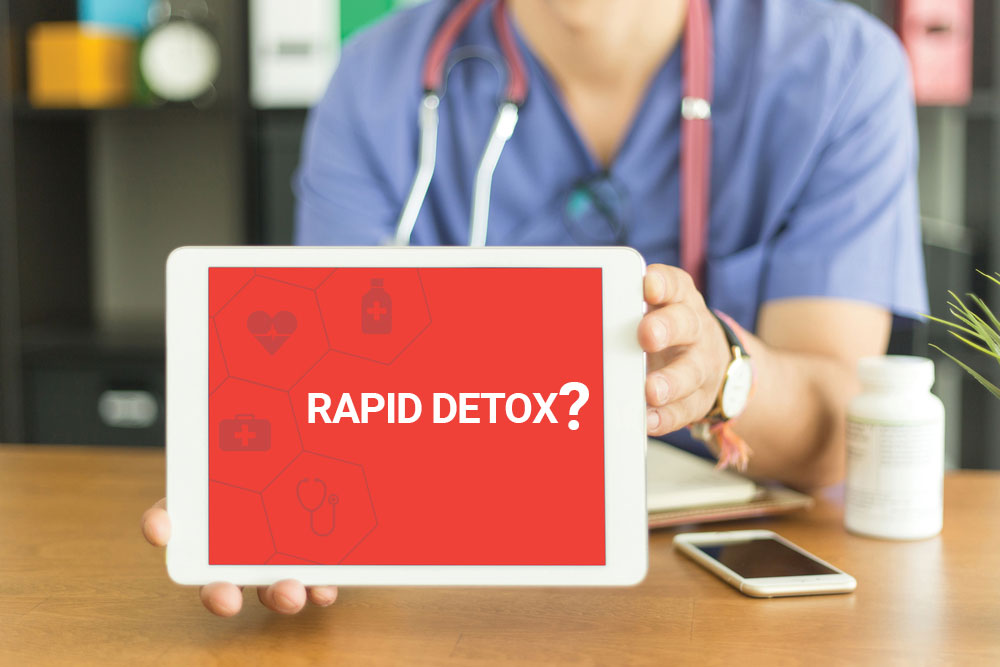
Be honest: if you could take a pill that would cure you of alcohol or drug addiction overnight, wouldn’t you go for it? It’s a tempting proposition. However, if the idea of a non-existent, painless withdrawal period seems too good to be true, that’s because it is.
It’s tempting to believe that a simple procedure could have the power to erase our addictions in a few days. Anyone who’s been through it, of course, will tell you that withdrawal doesn’t work like that. It takes time, and even once the physical symptoms have stopped, there’s still a ton of emotional baggage that needs to be processed and dealt with. Recovery isn’t just about letting your body heal and adjust to a life without substances. It’s also about learning where those destructive patterns came from so that you won’t fall into the same trap further down the line.
Though rapid detox programs have existed since the 1990s, they’re back in vogue today as the nation’s focus turns toward the growing opioid crisis. Rapid detox recovery programs promise a quick turnaround in which a patient is put under general anesthetic and treated with opioid blockers. The problem is, this process doesn’t actually speed up the patient’s recovery. After the patient wakes up, the withdrawal process is still underway. Even once a patient heads home, withdrawal symptoms, as well as the after-effects of the anesthetic, can still be felt for days. The idea that someone can speed through recovery isn’t just false, it’s dangerous. If you’re curious about rapid detox programs, here are a few important disclaimers and facts you should be aware of.
True: You Can’t Fast-track Withdrawal
Recovery isn’t just about the detoxing. When you’re trying to recover from substance abuse, you don’t just need to find a way for your body to handle the change. You also need to prepare for what’s going to greet you on the other side of your recovery center’s walls. As a newly sober person, you’ll be put in all kinds of stressful positions that could lead you to start using again. If you’re not equipped with the right professional help, you won’t have the tools you need to stay sober in the long term. That’s why traditional recovery centers are so important. They don’t just deal with the body. In recovery, you can talk to other people going through the same thing. You can share past experiences and dreams for the future. You can also strategize about how you’re going to avoid triggering situations, prioritize your mental health, and stay clean. In a rapid detox program, you’re sent home almost immediately after the procedure. You don’t get a chance to talk about what to expect after recovery, and you won’t be able to build a community or form a support group. If you’re serious about recovery, those things need to be prioritized.
False: Rapid Detox is Painless
Unfortunately, the lack of any mental health treatment is one of the least dangerous aspects of rapid detox treatment. Patients who undergo the procedure are often told that once they wake up, the worst of it is over. However, patients returning home after the procedure may complain of nausea, cravings, cramps, fever, and stomach pain. While the procedure is non-invasive and takes only five to ten hours to complete, patients are still subject to the risks associated with general anesthesia, such as infection, nausea, and dizziness. Some patients have even died as a result of rapid detox.
True: The Research Isn’t There
The main danger of rapid detox programs has to do with the lack of research surrounding the efficacy of the method. While these programs claim that their procedure is a pain-free alternative to traditional recovery, there has been almost no research to support this claim, especially with patients complaining of pain and nausea for hours afterward. While introducing opiate blockers like naltrexone have been proven to be effective, they’re administered to patients in consistent doses for weeks at traditional recovery clinics. Even organizations like the Centers for Disease Control and Prevention have come out in opposition to these programs, citing the mortality rate of anesthesia-assisted rapid opiate detoxification treatments. There is no scientific research or proof to support the idea that one giant dose administered once is more effective than a daily dose administered over several weeks. This, coupled with the fact that rapid detox doesn’t include any sort of therapy component, makes claims of its superiority to traditional treatment programs even more spurious.
False: Rapid Detox is the Best Treatment for Opioid Addiction
America is undergoing an opioid crisis. Naturally, rapid detox treatment centers want to do what they can to capitalize on the problem. These centers will often market themselves as the perfect solution for opioid addicts in large numbers. In places around the country where there’s an overwhelming amount of substance abuse, the idea of an express treatment center is an appealing one, especially for users who don’t have the time or the resources to spend weeks in traditional rehab. However, recovery is simply not something you can race through. Learning to live without the extra support provided by drugs and alcohol isn’t just about killing your body’s craving for the stuff. If you’re going to be able to live a sober life, you need to surround yourself with people and medical professionals who can help arm you with the tools you need to stay clean.
If you’re ready to recover the right way, start your journey today. Head to Restore Health and Wellness Center to start your new, sober life. We offer drug and alcohol detox and use proven methods to help you or a loved one break free from addiction. Visit us at 6918 Owensmouth Ave Canoga Park, CA 91303. 24/7 Admissions (818) 722-9019. On-Site Contact (818) 806-3914.












